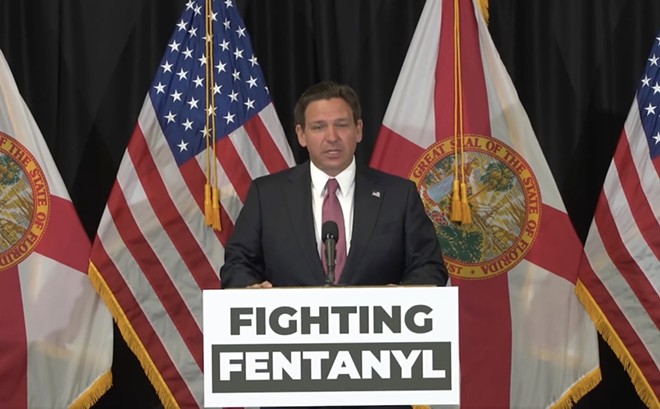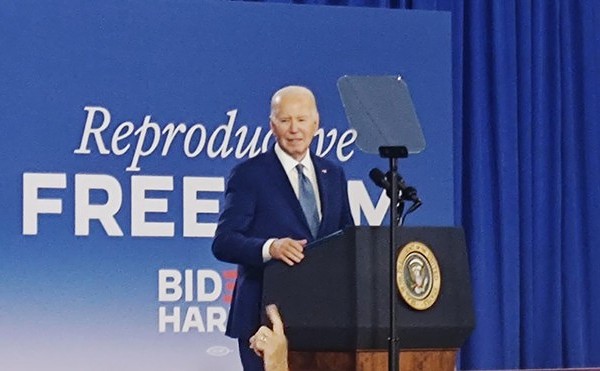Just moments after the governor said that he would sign two bills, one promoting opioid antagonists to prevent deaths from overdose and another boosting penalties for recklessly exposing first responders to fentanyl, Surgeon General Joseph Ladapo opened fire on athletic competitions that pit transgender women and girls against those who are biologically female.
Ladapo described the anti-fentanyl effort as a “common-sense and grounded idea” as compared to “so many things happening at leadership levels, at the federal level, whether it’s boys playing on girls’ teams and winning titles or other just things that don’t make sense.”
“Who thought it would be controversial to allow girls to compete with other girls and not have to compete with boys,” he continued.
DeSantis expanded on the concept in response to a reporter’s question, noting that he signed legislation three years ago forbidding transgender females from competing with biological females in high school or college.
As in the past, he argued Monday that it’s unfair to allow athletes with male biological characteristics to compete against women and girls.
“You do everything right. You work your tail off. You get into position and then all of a sudden you can have just the championship taken away from you. And why is it being taken away from these women and these girls who are competing in these competitions? It’s doing it because the people, the powers that be in these institutions like the NCAA, some of the high schools — not in Florida but some of these high schools — they just don’t have the courage to put their foot down and say no,” DeSantis said.
Lacking in courage
“They don’t have the courage to do what’s right because they’re worried about being politically incorrect. Yes, they will get attacked by different groups, of course, probably a lot of media organizations. But you know, that is not what leadership is all about. Leadership is about doing what’s right,” the governor said.
It was not clear what prompted Ladapo — the state’s chief public health officer, but one who has taken controversial positions on controlling COVID and measles, for example — to bring up transgender athletes. The Florida Department of Health has not yet responded to a question about that.
Transgender trans activist Lacey Love, contacted by the Phoenix, said she hadn’t heard about what Ladapo had said “and I’m not sure what, other than his normal bigotry, would have prompted the comment.”
Ladapo is a named plaintiff in a lawsuit challenging a state law, now partially enjoined, denying gender-affirming care to adults and minors in Florida.
NCAA policy handles trans competitions sport by sport and requires testing to ensure minimal testosterone levels for transgender women and girls.
Two bills
Regarding fentanyl, DeSantis signed two bills:
SB 718, which holds that “[a] person 18 years of age or older who, in the course of unlawfully possessing dangerous fentanyl or fentanyl analogs, recklessly exposes a first responder to dangerous fentanyl or fentanyl analogs and an overdose or serious bodily injury of the first responder results, commits a felony of the second degree,” punishable by up to 15 years in prison.
Some first responders have reported being affected by exposure to fentanyl, but medical experts note that fentanyl is difficult to ingest merely by exposure and that the symptoms listed in these cases more closely resemble panic attacks, a reported by National Public Radio.
DeSantis pointed to the case of a 19-year-old child who died of fentanyl toxicity after allegedly coming into contact with the drug at a Florida short-term rental unit in 2021; her family filed a lawsuit against Airbnb following the incident.
And SB 66, “Victoria’s Law,” designating an annual “Revive Awareness Day” each June 6 intended to promote administration of opioid antagonists like Narcan that can counteract the effects of these drugs and save lives.
That law is named after Victoria Siegel, who died of an overdose in 2015. She was the daughter of David Siegel, founder of the Westgate Resorts timeshare company, and his wife, Jackie, who were featured in “The Queen of Versailles,” a 2012 documentary about the family’s attempt to build a huge house in Florida, according to a CNN report. Jackie Siegel attended the news conference.
Overwhelming support
Both laws passed the Legislature overwhelmingly — SB 66 by a 39-0 vote in the Senate and SB 718 by 110-1 in the House, with nine members not voting. The only “no” vote was from Traci Koster, a Republican representing part of Hillsborough County. The Senate vote on the first-responder-exposure bill was 39-0 and the House vote was 100-12.
DeSantis remarked that traffickers sometimes lace other drugs with the vastly more potent fentanyl and catch users unawares.
“They’re not good to do,’ he said of these drugs, “but if you do some type of drug and it is laced with fentanyl the chance of you dying goes up tremendously. And there’s a lot of these opioid deaths that [are] really poisoning people with fentanyl, because maybe someone buys a pill thinking its something else, it’s laced with fentanyl, and then all of a sudden that one pill can be enough to kill somebody. And that happens, unfortunately, a lot,” DeSantis said.
Since taking office in 2019, DeSantis has led the creation of a statewide task force on opioid abuse led by Attorney General Ashley Moody. The effort has produced mobile response teams to treat overdoses plus the CORE network — for Coordinated Opioid Recovery Network.
Expanded network
That network began in 2022 in 12 counties and lets responders work together on treatment plans for addicts. Those counties were Brevard, Citrus, Clay, Duval, Escambia, Flagler, Gulf, Manatee, Marion, Pasco, Pinellas, and Volusia.
DeSantis announced plans to expand the network to another 17 counties: Bay, Broward, Collier, Hernando, Hillsborough, Indian River, Lake, Lee, Leon, Miami-Dade, Monroe, Okaloosa, Orange, Polk, Sarasota, Seminole, and St. Lucie.
Some 48.9% of the patients in the program have received medication intended to help them recover, compared to a national average of 18.8%, according to the governor’s office. In addition,18,000 emergency calls have resulted administration of naloxone.
The data show a 9% decrease in opioid deaths between September 2022 to September 2023 compared to the same period one year earlier, or 557 fewer deaths, the governor’s office said.
Additionally, the state has boosted penalties for fentanyl and methamphetamine trafficking.
Florida Phoenix is part of States Newsroom, a nonprofit news network supported by grants and a coalition of donors as a 501c(3) public charity. Florida Phoenix maintains editorial independence. Contact Editor Diane Rado for questions: [email protected]. Follow Florida Phoenix on Facebook and Twitter.Governor DeSantis Signs Legislation to Fight the Opioid Epidemic https://t.co/VSg0J5kM9D
— Ron DeSantis (@GovRonDeSantis) April 8, 2024
Subscribe to Orlando Weekly newsletters.
Follow us: Apple News | Google News | NewsBreak | Reddit | Instagram | Facebook | Twitter | Or sign up for our RSS Feed


















